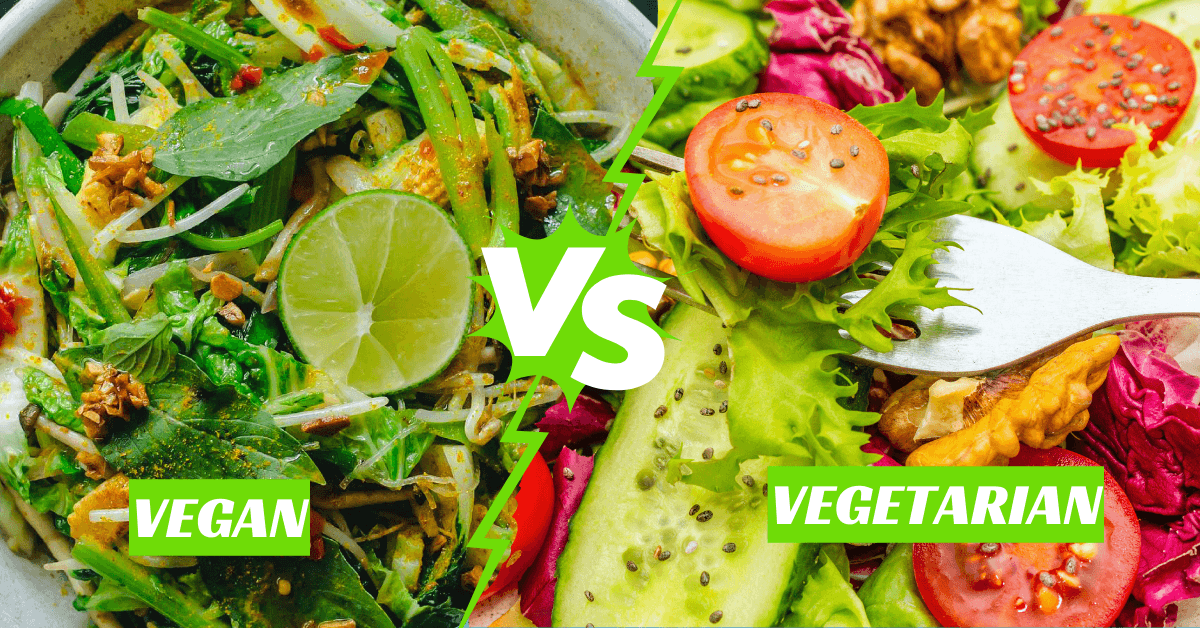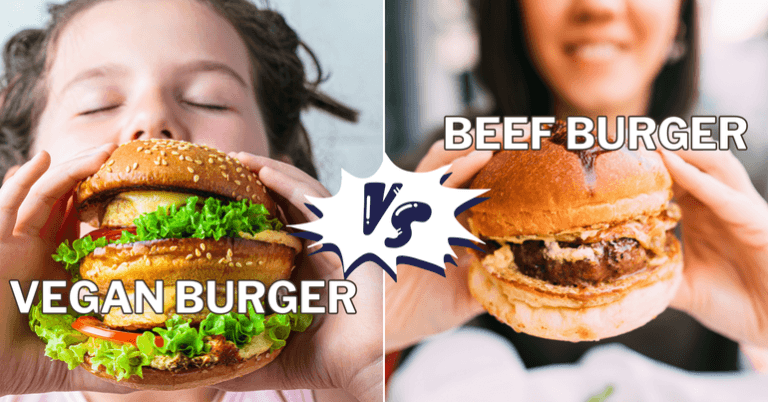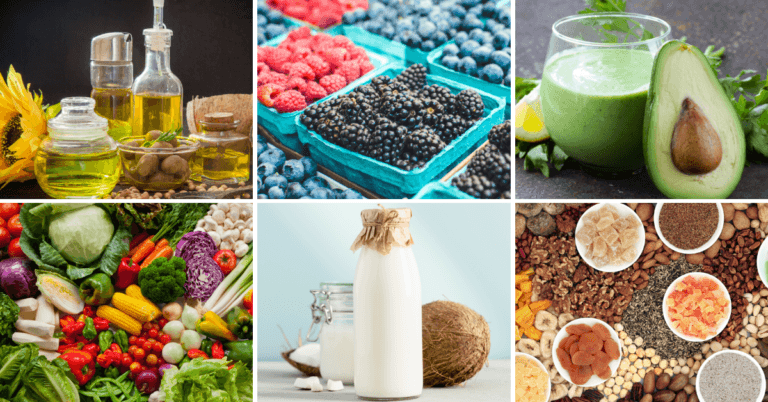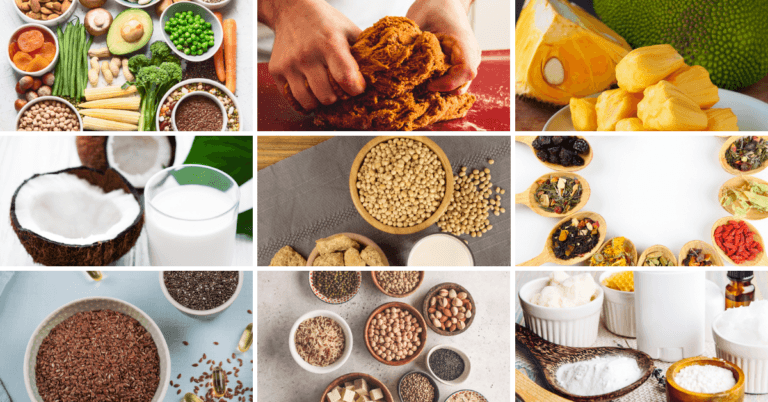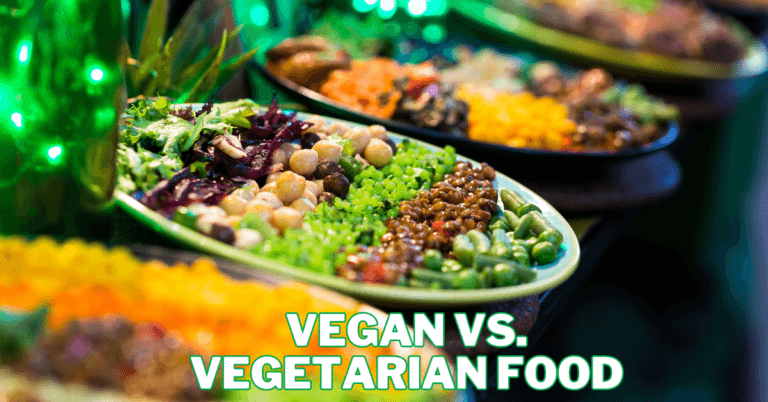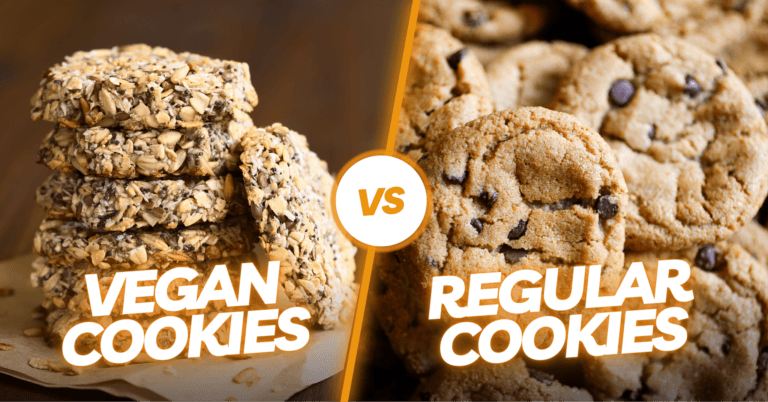Vegan vs Vegetarian: Understanding The Difference & Benefits
Choosing a plant-based lifestyle often sparks the question: vegan vs vegetarian? While both prioritize plant foods, their differences go beyond diet. Understanding these distinctions helps highlight their unique benefits, from ethical choices to health advantages.
Whether you're curious about omitting animal products entirely or embracing flexibility, this guide will unpack the essentials, making your journey to plant-based living more informed and meaningful.
What Is Veganism?
Veganism is a lifestyle that aims to eliminate all forms of animal exploitation and cruelty. It extends beyond diet to encompass clothing, cosmetics, and daily habits.
At its core, veganism avoids consuming animal-derived products, including meat, dairy, eggs, honey, and gelatin. Vegans prioritize plant-based foods like fruits, vegetables, grains, nuts, seeds, and legumes, ensuring balanced nutrition.
Beyond food, they choose cruelty-free and eco-friendly products, avoiding leather, wool, and silk materials. Veganism often stems from ethical concerns about animal rights, environmental sustainability, and personal health.
It contributes significantly to resource conservation, climate change mitigation, and greenhouse gas emission reduction.
Many people follow this diet because veganism may have health benefits, such as better heart health, lower cholesterol, and a lower risk of chronic diseases.
Ultimately, veganism represents a compassionate, mindful approach to living that aligns with values of kindness, sustainability, and well-being for all beings and the planet.
What Is Vegetarianism?
The vegetarian diet emphasizes plant-based foods such as fruits, vegetables, grains, nuts, seeds, and legumes while avoiding meat, fish, and fowl.
While vegetarians avoid consuming animal flesh, many include animal-derived products like dairy, eggs, and honey in their diets.
This dietary choice often stems from ethical concerns about animal welfare, environmental sustainability, and personal health.
Vegetarianism lowers greenhouse gas emissions by reducing reliance on meat production and conserves water and land resources. Its health advantages include decreased risk of high blood pressure, heart disease, and certain cancers.
Variations of vegetarianism, such as lacto-vegetarianism (dairy but no eggs) and ovo-vegetarianism (eggs but no dairy), offer flexibility based on individual preferences.
Ultimately, vegetarianism reflects a conscious lifestyle choice that balances nutritional needs with a commitment to compassion, sustainability, and mindful living.
Critical Differences Between Veganism And Vegetarianism
Veganism and vegetarianism are both plant-based lifestyles, but they differ in their approach to animal products and overall philosophy. Thus, the debate of veganism vs vegetarianism is critical for those seeking a plant-based lifestyle.

1. Diet Composition
Veganism
Vegans eliminate all animal-derived products from their diet, including meat, dairy, eggs, honey, and ingredients like gelatin. They focus entirely on plant-based foods such as fruits, vegetables, grains, legumes, nuts, and seeds.
Vegetarianism
Vegetarians avoid meat, fish, and poultry but may include animal-derived foods like dairy, eggs, and honey. The extent of inclusion varies depending on the type of vegetarianism (e.g., lacto-vegetarian, ovo-vegetarian, or lacto-ovo vegetarian).
2. Ethical Focus
Veganism
Veganism is a lifestyle aimed at eliminating all forms of animal exploitation and cruelty. This principle extends beyond diet to choices in clothing, cosmetics, and household products, avoiding items made from leather, wool, silk, or tested on animals.
Vegetarianism
While some vegetarians adopt the diet for ethical reasons, the focus is typically limited to reducing harm through food. Vegetarians may still use animal-derived products like leather or wool, depending on personal beliefs.

3. Environmental Impact
Veganism
A vegan lifestyle is often more sustainable because it avoids all animal agriculture, which is a leading contributor to deforestation, water depletion, and greenhouse gas emissions.
Vegetarianism
Although vegetarian diets are less harmful to the environment than meat-based ones, they still require the production of dairy and eggs, which increases emissions and resource consumption, though not as much as meat production.
4. Nutritional Considerations
Veganism
Vegans must carefully arrange their diets to ensure they get vital nutrients like vitamin B12, iron, calcium, and omega-3 fatty acids, which are more frequently found in animal products. Supplements and fortified foods are commonly required.
Vegetarianism
Vegetarians generally have fewer nutritional gaps since they consume dairy and eggs, which provide B12, calcium, and other nutrients. However, both groups must monitor their diets for balanced nutrition.
5. Variations And Flexibility
Veganism
Veganism is strict and leaves little room for flexibility, as it prohibits all animal-derived items. It is often seen as an all-encompassing lifestyle rather than just a diet.
Vegetarianism
Vegetarianism is more adaptable, with variations like pescatarianism (including fish), lacto-vegetarianism (including dairy), and ovo-vegetarianism (including eggs), allowing individuals to tailor their diet to personal preferences.
6. Accessibility And Social Acceptance
Veganism
Veganism can be challenging in specific social or cultural settings with limited plant-based options. Finding vegan substitutes for standard products may also require extra effort.
Vegetarianism
Vegetarianism is often more widely accepted and accessible, accommodating many cuisines and social settings, as dairy and egg options are expected.

7. Cultural And Religious Influences
Veganism
The distinction between veganism and vegetarianism lies in their cultural and ethical foundations. Veganism is driven by modern ethical, environmental, or health motivations, while vegetarianism is deeply rooted in cultural and religious practices.
Vegetarianism
Vegetarianism has deep roots in many cultures and religions, including Hinduism, Buddhism, and Jainism. In these traditions, vegetarianism is often linked to spiritual purity, nonviolence, or karmic principles, making it more culturally ingrained in certain regions.
Benefits Of Vegan And Vegetarian Diets
The vegan vs vegetarian controversy highlights the distinct benefits each diet—depending on how much emphasis is placed on plant-based versus animal-derived foods—offers for one's health, the environment, and animal welfare.
Health Benefits
1. Improved Heart Health
Both vegan and vegetarian diets focus on fruits, vegetables, whole grains, and legumes, as they are naturally high in fiber and low in saturated fats.
These foods help lower cholesterol levels and blood pressure, reducing the risk of heart disease. Vegans may have an additional edge, as their diet excludes all animal products, lowering saturated fat intake.
2. Weight Management
Plant-based diets are often lower in calories and higher in fibre, which promotes satiety and helps with weight management.
Vegans typically have lower body mass indices (BMIs) than vegetarians and omnivores because they avoid high-calorie foods like dairy and eggs.
3. Reduced Risk Of Chronic Diseases
In whole plant-based meals, antioxidants, vitamins, and minerals guard against inflammation and oxidative stress. Vegetarians who often consume dairy may also benefit from nutrients like calcium and vitamin D, which support bone health.
4. Improved Gut Health
Plant-based diets' high fiber content promotes healthy gut flora, which enhances digestion and lowers the risk of gastrointestinal problems.
Fermented plant foods like kimchi and tempeh, commonly included in vegan diets, improve gut health by introducing beneficial probiotics.
5. Longevity And Quality Of Life
A plant-based diet is associated with longer life. Consuming fewer processed foods and animal products promotes a healthier, more active life and reduces the risk of age-related disorders.
Environmental Benefits
6. Lower Carbon Footprint
Vegan and vegetarian diets significantly reduce greenhouse gas emissions compared to meat-based diets. Animal agriculture substantially contributes to climate change, and reducing reliance on this industry helps combat global warming. Veganism, which avoids dairy and eggs, has the smallest environmental footprint of all diets.
7. Resource Conservation
Plant-based foods require less land, water, and energy than animal farming. For example, growing crops like lentils and beans takes far less water than raising livestock. Vegetarianism and veganism contribute to conserving these precious resources, benefiting the planet.
8. Prevention Of Habitat Destruction
Animal agriculture, which involves clearing forests for grazing or producing animal feed, significantly contributes to deforestation.
Plant-based diets, on the other hand, enhance biodiversity and protect habitats by reducing the need for land-intensive farming.

Ethical Benefits
9. Animal Welfare
The difference between vegan and vegetarian diets is their focus on animal welfare. Vegans avoid all animal-derived products to reduce exploitation, while vegetarians primarily avoid meat to decrease animal slaughter.
By abstaining from meat, vegetarians contribute to decreased animal slaughter. Vegans take this further by avoiding all animal-derived products, including dairy and eggs, which often involve exploitation and poor living conditions for animals.
10. Supporting A Compassionate Lifestyle
Choosing a plant-based diet reflects a commitment to compassion and ethical living. It promotes awareness of the interconnectedness of humans, animals, and the environment, fostering more mindful consumption habits.
Practical Benefits
11. Affordability
Plant-based diet staples, such as beans, rice, lentils, and vegetables, are often more affordable than meat, making vegan and vegetarian diets cost-effective. While specialty vegan products like plant-based meats can be pricey, a diet centred on whole foods is economical.
12. Global Accessibility
Plant-based ingredients are widely available worldwide, making adopting a vegan or vegetarian diet easier. Many traditional cuisines, such as Indian, Mediterranean, and Middle Eastern, already incorporate plant-based recipes, offering a rich variety of flavorful options.
13. Culinary Creativity
Both diets encourage creativity in the kitchen, inspiring individuals to experiment with new ingredients, cuisines, and cooking techniques.
Vegan substitutes, such as cashew cream and jackfruit, add diversity to meals, while vegetarians can explore recipes featuring cheese and eggs.
Shared Benefits
14. Increased Energy Levels
The nutrient-dense nature of plant-based diets provides sustained energy thanks to the abundance of complex carbohydrates, vitamins, and minerals. Many people feel lighter and more energized after switching to a vegan or vegetarian diet.
15. Enhanced Skin Health
The high intake of antioxidants and hydration-rich foods, such as fruits and vegetables, contributes to clear, glowing skin. Avoiding dairy, in particular, may help reduce acne and other skin conditions.
16. Positive Social Impact
Switching to a plant-based diet can encourage others to follow suit, triggering a beneficial chain reaction. As more individuals cut back on their animal product consumption, the demand for sustainable and ethical food is rising, pushing the industry to change.
A vegan or vegetarian diet offers numerous advantages but can also present issues. Here’s a breakdown of some common difficulties and tips for overcoming them:
Want to Share Your Passion for Vegan Living?
Discover how easy and fulfilling vegan living can be —
from recipes and travel to lifestyle and sustainability tips.
Read this blog post next:
How to Start a Vegan Blog (and Turn Your Passion into Purpose).
Challenges Of Vegan And Vegetarian Diets
Adopting a vegan or vegetarian lifestyle offers many benefits but presents challenges. From meeting nutritional needs to navigating social situations, understanding these hurdles and finding solutions can make the transition more accessible and sustainable.
1. Nutritional Deficiencies
Challenge
Vegans and vegetarians can face nutrient gaps, including vitamin B12, iron, omega-3s, and protein. Balance your diet with fortified foods, supplements, and a variety of plant-based sources for optimal health.
Solution
- Include fortified foods (e.g., plant-based milks, cereals).
- Incorporate diverse protein sources like lentils, beans, tofu, and quinoa.
- Consider supplements for B12 or omega-3 from algae.
2. Limited Options While Dining Out
Challenge
Many restaurants need more diverse vegan or vegetarian options, often offering only salads or sides. Advocating for creative, plant-based dishes can help cater to this growing demand and ensure inclusivity.
Solution
- Research restaurants in advance using apps like HappyCow.
- Don’t hesitate to ask for customized dishes or explore ethnic cuisines like Indian or Mediterranean, which often have plant-based dishes.
3. Social And Cultural Barriers
Challenge
Friends, family, or cultural traditions may struggle to understand plant-based diets. Open communication, sharing delicious recipes, and celebrating plant-based alternatives can foster acceptance and accommodate diverse dietary choices.
Solution
- Communicate your dietary preferences clearly and offer to bring a dish to gatherings.
- Share the benefits and delicious recipes to encourage understanding.
4. Cravings Or Adjusting To New Flavours
Challenge
Transitioning from meat-based diets can cause cravings or dissatisfaction. Experimenting with flavourful plant-based recipes, spices, and protein-rich alternatives helps ease the shift and sustainably satisfy cravings.
Solution
- Experiment with meat substitutes like jackfruit, seitan, or Beyond Meat products.
- Use bold seasonings, sauces, and spices to enhance flavours.
5. Time And Effort In Meal Preparation
Challenge
Preparing balanced vegan or vegetarian meals may seem time-consuming, but with meal prepping, simple recipes, and quick plant-based staples, you can easily enjoy nutritious, delicious meals.
Solution
- Meal prep in advance or use simple recipes.
- Invest in kitchen gadgets like slow cookers or air fryers to streamline cooking.
6. Cost Of Specialty Products
Challenge
Some vegan or vegetarian products, like cheese alternatives or protein powders, can be pricey. Opt for affordable whole foods such as beans, lentils, tofu, and homemade alternatives to save money.
Solution
- Concentrate on whole foods such as beans, lentils, and seasonal vegetables.
- Buy in bulk or look for local markets to save money.
7. Lack Of Knowledge About Balanced Nutrition
Challenge
Inadequate knowledge of balancing a vegan or vegetarian diet may cause nutrient deficiencies. Learning about diverse food groups, supplements, and meal planning ensures a healthy and sustainable lifestyle.
Solution
- Learn about nutrition through reputable sources or consult a dietitian.
- Track your intake using apps like Cronometer to ensure you're meeting your needs.
Is One Diet Better Than The Other?
The choice between vegan vs vegetarian diets ultimately depends on individual priorities, health needs, and lifestyle goals, as both offer distinct benefits and levels of commitment.
Both diets provide significant benefits, such as improved health, reduced environmental impact, and ethical alignment, but they cater to different levels of commitment and dietary flexibility.
Veganism eliminates all animal-derived products, making it the most ethical and environmentally sustainable option. It is ideal for those deeply committed to animal welfare and reducing their carbon footprint.
However, vegans must carefully plan meals to avoid deficiencies like B12, iron, and calcium, often requiring supplements or fortified foods.
Conversely, vegetarianism includes dairy and eggs, providing a more comprehensive range of nutrients naturally and making it easier to maintain a balanced diet.
It is more flexible and culturally adaptable, especially for beginners or those living in regions with limited vegan options.
However, vegetarians still contribute to some environmental impact and animal exploitation through dairy and egg consumption.
Neither diet is universally “better.” The choice depends on personal ethics, nutritional goals, and lifestyle compatibility. Both paths contribute positively to health and the planet, and either can be the right choice when thoughtfully practiced.
FAQs
Q1: What Is The Main Difference Between Vegan And Vegetarian Diets?
Answer: Vegans avoid all animal products, while vegetarians include dairy and eggs but avoid meat, poultry, and fish.
Q2: Which Diet Is Healthier: Vegan Or Vegetarian?
Answer: Both can be healthy when well-planned. Vegan diets may lower cholesterol and saturated fat intake, while vegetarian diets naturally include more nutrients like calcium and B12.
Q3: Is It More Accessible To Transition To Vegetarianism Or Veganism?
Answer: Vegetarianism is generally more accessible since it allows dairy and eggs, offering more dietary flexibility.
Q4: Are Vegan Diets More Environmentally Friendly Than Vegetarian Diets?
Answer: Yes, vegan diets have a smaller environmental footprint since they exclude dairy and eggs, contributing to greenhouse gas emissions.
Q5: Can You Get Enough Protein On A Vegan Or Vegetarian Diet?
Answer: A balanced diet with plant-based protein sources like quinoa, lentils, beans, and tofu provides enough protein.
Q6: Do Vegans Need Supplements?
Answer: Vegans often need supplements for nutrients like B12, omega-3, and vitamin D, as these are limited in plant-based foods.
Q7: Can Both Diets Improve Heart Health?
Answer: Both diets are linked to lower cholesterol and reduced heart disease risk because they focus on plant-based, low-saturated-fat foods.
Conclusion
In conclusion, the debate of vegan vs vegetarian ultimately comes down to personal values, dietary preferences, and lifestyle goals.
Both offer unique advantages for health, sustainability, and ethical living. The choice between the two depends on personal values, dietary preferences, and lifestyle goals. Ultimately, every step toward plant-based eating makes a positive impact.
I trust you enjoyed this article on Vegan vs Vegetarian: Understanding the Difference & Benefits. Please stay tuned for more plant-based recipes, vegan travel tips, and lifestyle inspiration.
Take care!
— JeannetteZ 🌿
💬 Your Opinion Is Important To Me
Do you have thoughts, ideas, or questions? I’d love to hear from you. Please leave your comments below, or email me directly at Jeannette@LivingTheVeganLifestyle.org.
📚 More Vegan Lifestyle Reads
🌱 My #1 Recommendation for Online Success
Sharing my passion for vegan living — from food to fashion — has been such a rewarding journey.
If you’ve ever dreamed of building your own ethical lifestyle brand or blog, this is the best place to start.
🌟 See How Vegan Bloggers Build Online Income — Try WA Free (No Credit Card Needed)
Disclosure
This post may contain affiliate links. As an Amazon Associate and participant in other affiliate programs, I earn from qualifying purchases at no extra cost to you. Please read my full affiliate disclosure.

